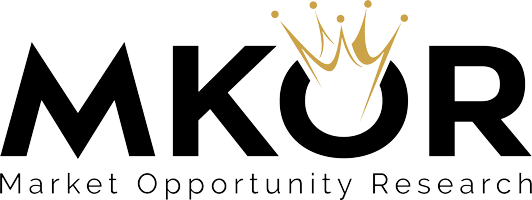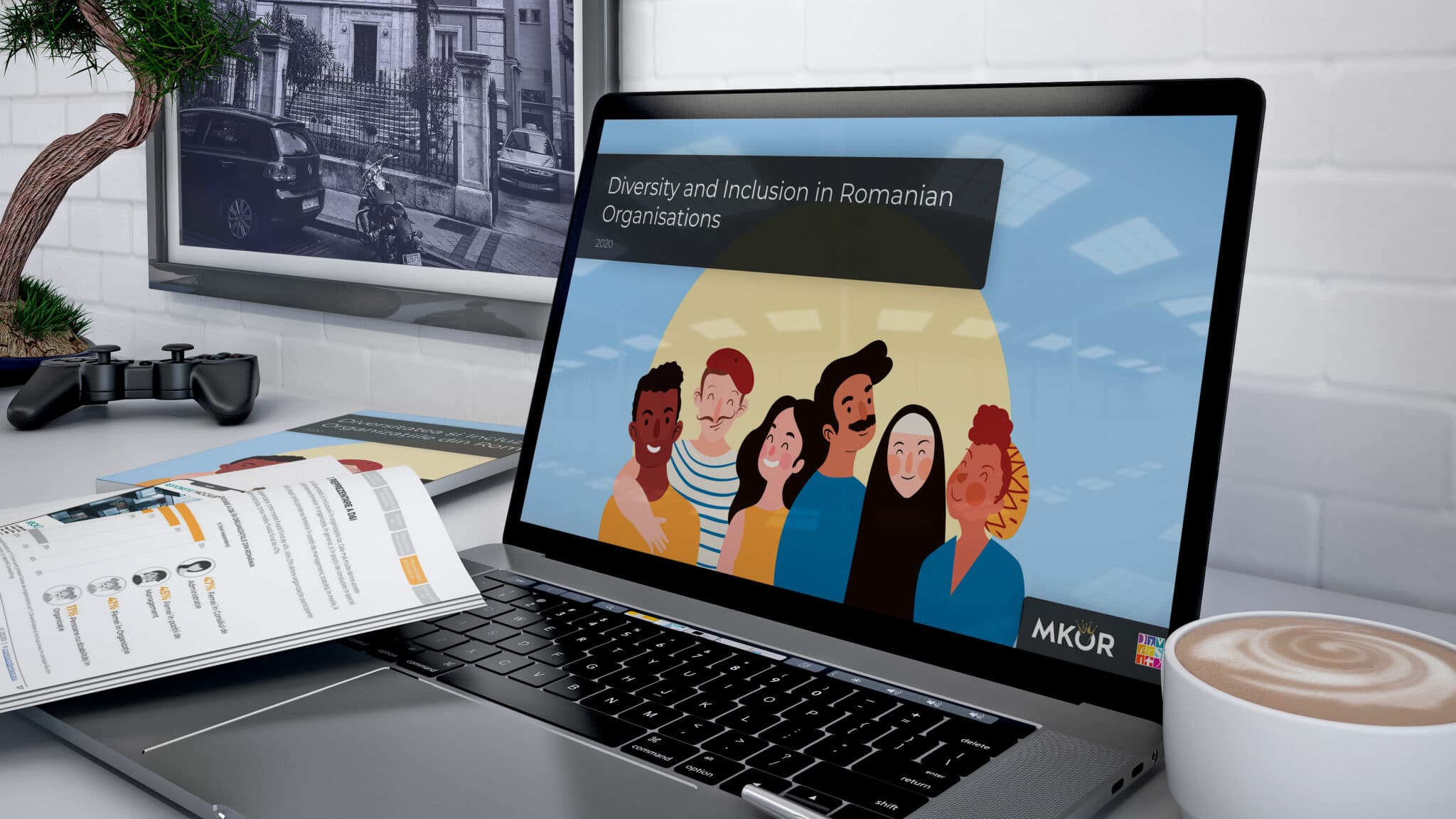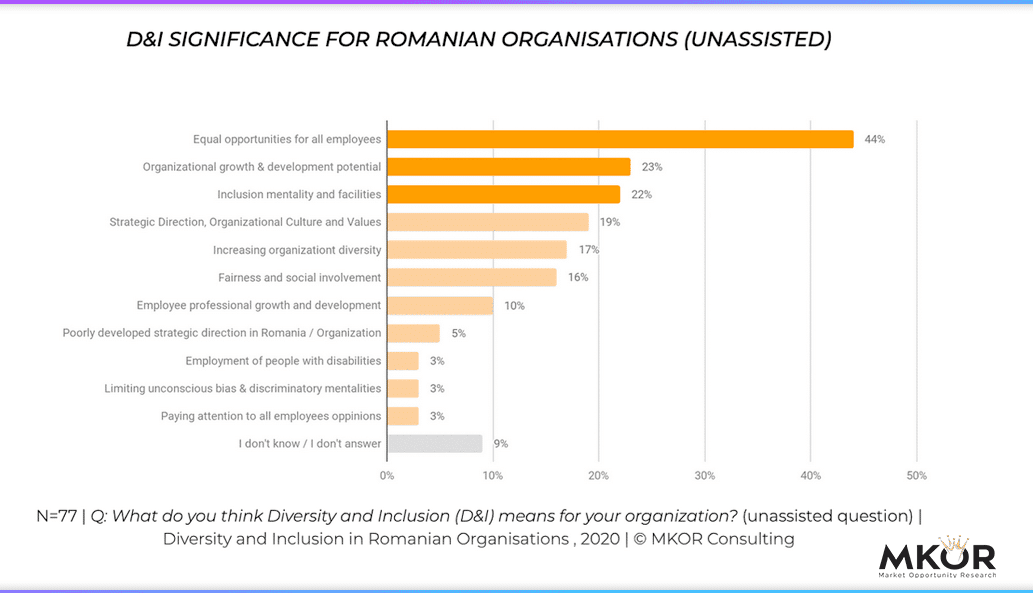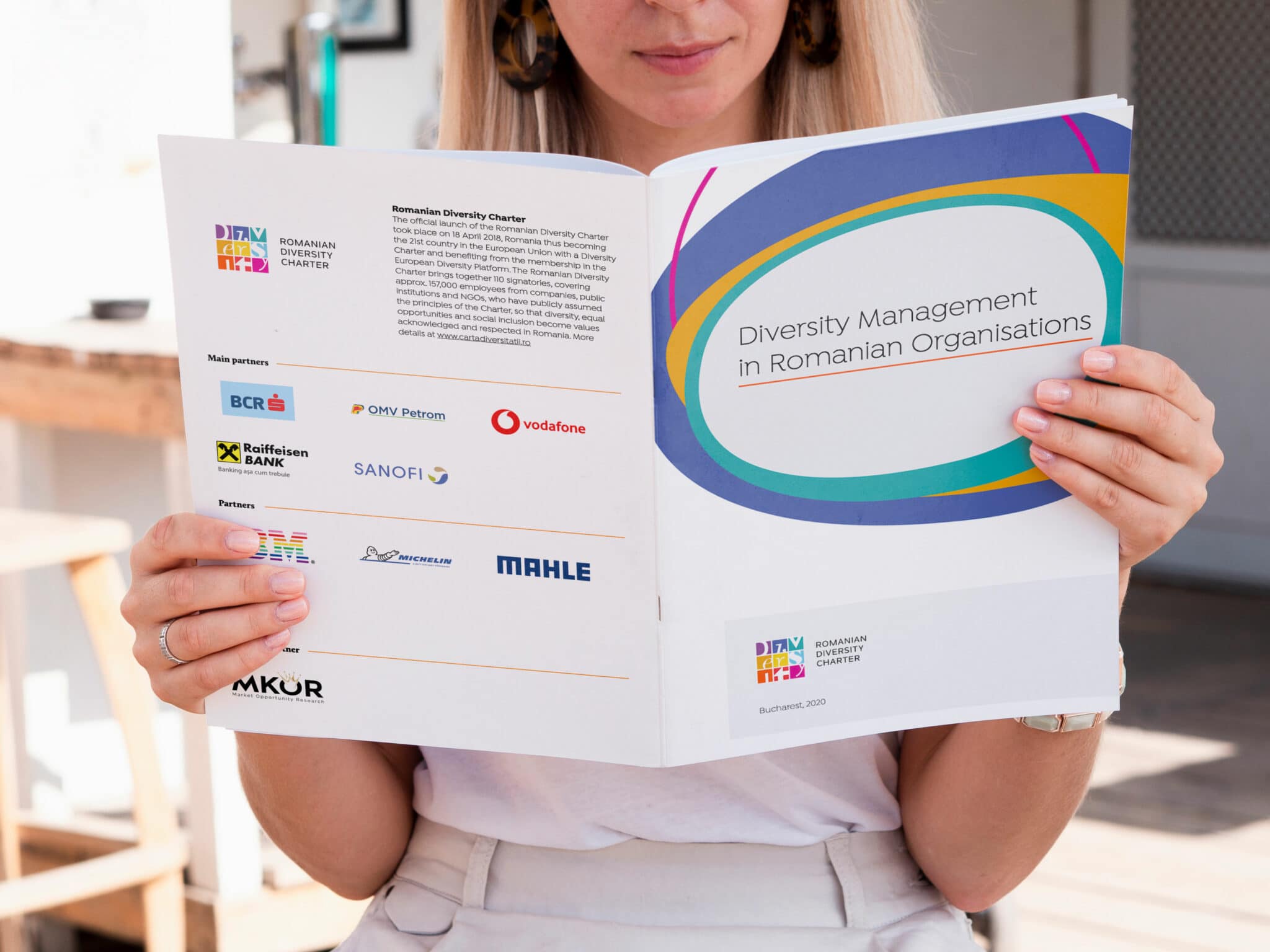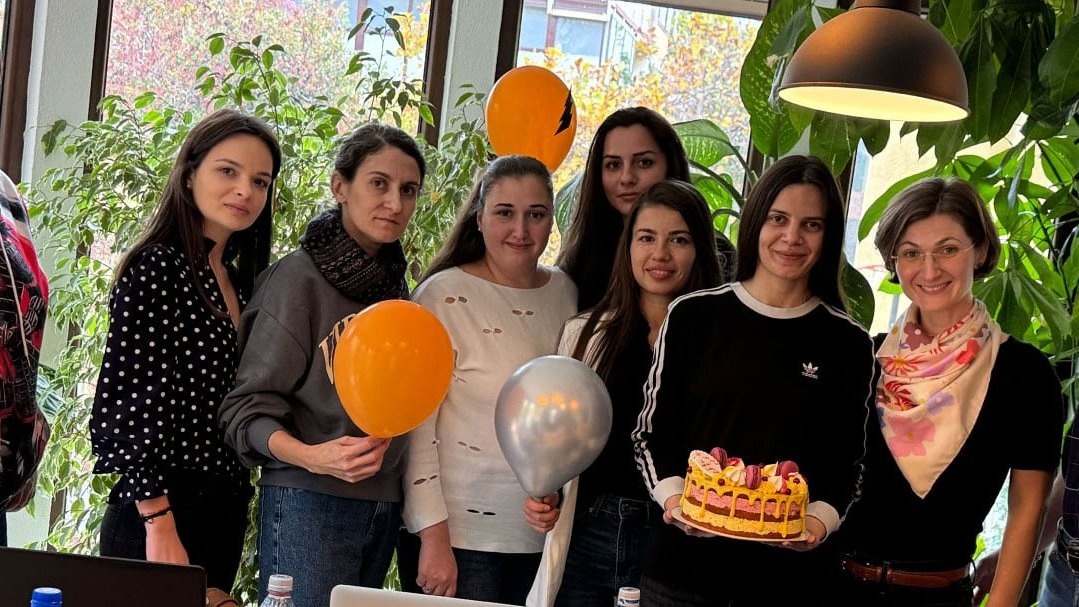Diversity and Inclusion (D&I) are popular terms in corporations’ and big organisations’ language and policies all over the world.
However, for Romanian organisations, Diversity and Inclusion management is still in its infancy. D&I practices are mostly imported, through large, well known organisations’ Human Resources departments, while D&I policies are adjusted to Romanian legislation, local culture and mentalities.
MKOR strongly adheres to the D&I values, and is one of the first proud signatories of the Romanian Diversity Charter, ever since its launch, in 2018.
That is why, when Romanian Diversity Charter approached us to help them explore how Romanian organisations are assimilating Diversity and Inclusion principles, our team got immediately onboard.
Thus, MKOR Consulting ran the first study about D&I management in Romanian organisations, having as main objectives:
- How do Romanian organisations relate to Diversity and Inclusion principles?
- How are Diversity and Inclusion principles being approached by Romanian organisations?
- Which KPIs do Romanian organisations use for measuring their Diversity and Inclusion principles progress?
Key take-aways from the Diversity and Inclusion in Romanian Organizations Report
Diversity and Inclusion is a principle that stands for embracing different people for who they are – regardless of their culture, sexual orientation, gender, age, religion, ethnicity, vulnerability or social environment.
Diversity and Inclusion does not just mean empowering people by appreciating and respecting what makes them different and unique. This principle has a large positive effect on businesses, irrespective of their size, field of activity or geographical positioning.
The reason is simple: a diverse work environment means variety in approaching business problems, which supports organisational growth. This is a win-win situation: people feeling included, secure and appreciated drive business growth.
The benefits of D&I values are numerous, and here are some of the most important:
- Increased employee wellbeing;
- More creative ideas and new ways of thinking;
- Diversity and Inclusion management has a direct impact on increasing motivation and satisfaction at work.
Key research findings:
- In Romania, most organisations declare their support for Diversity and Inclusion principles, and stand for equal chances for all employees.
- Over 70% of Romanian organisations strongly believe that employee motivation and job satisfaction increase when the work environment is diverse and inclusive. At the same time, adopting and managing D&I practices has a large impact on business growth.
- 44% of the Romanian organisations support Diversity and Inclusion by offering equal opportunities for all employees.
- 78% declare offering equal pay & benefits for equal work.
- 69% of organisations consolidate D&I principles in the recruitment process.
- 60% of large companies have D&I strategies, while almost 86% of the public institutions participating in the study have a targeted approach to Diversity and Inclusion practices.
- 47% of SMEs and 44% of micro-enterprises have a one-off approach on D&I practices.
Full access: Download the "Diversity and Inclusion in Romanian Organizations" Report – and browse through all our findings
What does Diversity and Inclusion mean for Romanian Organizations?
According to our study, for most organisations in Romania, Diversity and Inclusion stands for equal chances for all employees.
The research revealed that 44% of the organisations participating in the study assimilate Diversity and Inclusion with equal opportunities for all employees, regardless of their gender, age, religion, ethnicity, vulnerability or social environment.
Moreover, 78% of the organisations participating in the survey declared offering equal pay for equal work. This policy is a main focus for the interviewed organisations, whether they are large or small, or public institutions.
Higher positions within the company are awarded on well-established criteria that are communicated to all employees, ensuring equal opportunities for career growth without discrimination (61% of respondents).
The study also shows that 69% of organisations integrate the Inclusion principle in the recruitment process.
Diversity and Inclusion Management Benefits
One of the top benefits of D&I revealed by the study is employee wellbeing: 35% of respondents believe that Diversity and Inclusion management increases employee wellbeing by creating a collaborative environment.
Another advantage is the growth potential for organisations: 29% of the respondents believe that diverse teams mean diversity in ideas and ways of thinking.
Employee motivation and job satisfaction also increase when the work environment is diverse and inclusive.
For companies, Diversity and Inclusion drive business growth. By letting people know they are empowered and valued for being unique, they have the courage to come up with and argue their opinions.
Diversity and Inclusion practices in Romanian Organizations
However, just speaking about Diversity and Inclusion does not mean actually supporting these principles. The real endorsement comes when organisations establish rules and practices aimed to sustain them.
In Romania, the larger the companies, the more they tend to incorporate the Diversity and Inclusion principles into their strategies and core values, allocating more financial and human resources to implement D&I practices.
The study shows that 60% of large companies have D&I strategies and 33% allocate annual budgets for them. On the other hand, 47% of SMEs and 44% of micro-enterprises have a one-off approach, and only 6% of SMEs allocate Diversity and Inclusion budgets. Almost 86% of the public institutions participating in the study have a targeted approach to Diversity and Inclusion practices.
The most common practices that support Diversity and Inclusion in Romanian organisations:
- Non-discrimination in recruitment, selection and promotion policies;
- Training and Development programs;
- Flexible hours;
- Employee Support.
Difficulties in Implementing D&I Practices
Difficulties and barriers are met everywhere, in any organisation, regardless of the matter. If companies are eager to align with global principles of Diversity and Inclusion, some factors act as obstacles.
The study reveals that 1 in 4 organisations participating in the study mention people’s mentalities, culture, and prejudices – both of employees’ and managers’ – as the main barrier to implementing Diversity and Inclusion practices.
Lack of clear staff policies, procedures, and D&I strategies, together with limited human resources are two other important limitations for D&I implementation in Romanian organisations.
Main KPIs used to measure the Diversity and Inclusion practices
To keep track of their efforts in Diversity and Inclusion practices implementation, Romanian organisations establish measurable KPIs.
According to the study, 70% of the participants have measurable targets to represent Diversity and Inclusion in their organisations. Most large companies have measurable targets (93%), while only 40% of micro-enterprises have D&I targets.
50% of Romanian organisations aim to have women in their management teams, and have set a target of 45% of all management positions for women. This is the main D&I objective for large companies and SMEs. 36% of them aim to increase the overall share of women in their organisation, with an average target of 41% of all positions.
21% of the organisations participating in the study plan to have women represented on the Board of Directors, with an average target set at 47% of all board positions.
However, even if they have clear KPIs for D&I, 52% of organisations do not have the tools for monitoring their progress in this regard.
Organisations assessing the performance of D&I policies aim to achieve a gender balance in the share of all employees, both in terms of staff and management.
Although they have measurable KPIs for Diversity and Inclusion practices, more than half of the organisations do not use them to keep track of their results.
Full access: Download the "Diversity and Inclusion in Romanian Organizations" Report – and browse through all our findings
Methodological specifications
The survey was conducted between August 2019 and December 2019, on a sample of 77 private organisations & NGOs from Romania. The respondents were entrepreneurs, managers, HR specialists, that are in charge of Diversity and Inclusion principles in Romanian organizations.
The main aim of the study was to develop a first conceptualised view of diversity initiatives in the Romanian working environment while also establishing what the main driving forces behind these initiatives are. The study offers in our view valuable insights into how Romanian organizations relate to diversity and inclusion principles and how they measure their D&I progress.
Special Thanks to Our Partners for This Study
This study has reached so many decision makers and specialists in Romanian organisations with the help of our partners, which have promoted our endeavour in their communities.
We’d like to thank: The Romanian Diversity Charter, HR Club, Exec-Edu, PWN Romania.
About the Romanian Diversity Charter
The official launch of Romanian Diversity Charter took place on 18 April 2018, Romania thus becoming the 21st country in the European Union with a Diversity Charter and benefiting from the membership in the European Diversity Platform. Created by a local consortium after a consultation process and involving a wide range of stakeholders, inspired by the European diversity movement and endorsed by various types of organizations, the Charter seeks to establish a multi-stakeholders platform and provide a new framework for thinking about and addressing diversity and inclusion issues.
In June 2020, The Charter has launched a publication marking two years of Romanian Diversity, showcasing best practices in Romanian organisations.
The publication is a collaborative effort of the Romanian Diversity Charter and its signatories and explores the concept of diversity management in the workplace, with particular emphasis on Romanian companies.
With the goal to inspire, support, encourage and motivate organizations in their efforts to move forward the diversity and inclusion agenda, this publication offers at the same time a quick-to-read and practical guide based on successful initiatives implemented in diversity management by Romanian organisations. 15 D&I practical examples for achieving workforce diversity were showcased with the aim to inspire other organisations in their D&I efforts
Over the last years, more and more companies have already taken diversity on board as a social fact and as an asset in terms of their activities. More and more companies have developed diversity management strategies and have teamed up with other organisations to make diversity management part of their business strategy. But we must also acknowledge that other companies have still a long way to go. This publication also explores some key challenges to inclusion from an organizational diversity and inclusion perspective.
Full access: Download the "Diversity and Inclusion in Romanian Organizations" Report – and browse through all our findings
Stay Connected to MKOR
Here, at MKOR Consulting, we live up to our own advice and constantly conduct in-house studies in order to stay in touch to the latest innovations in marketing, technology and business.
Thus, along with our clients’ projects, we conduct our proprietary studies and market reports. We are delighted to offer this data, free of charge, to any interested person.
Hungry to find out more? Explore our Portfolio or, if you want to meet us and work together, tell us about our ideas!
Have you read everything? Comment / join our newsletter / read our other research posts!
What Is Brand Tracking? A Complete Guide to Monitoring Your Brand’s Health
February 19, 2025
0 Comments13 Minutes
MKOR Study: Beyond the 450 RON Budget, Parents’ Real Concern Is Bullying
September 8, 2025
0 Comments24 Minutes
